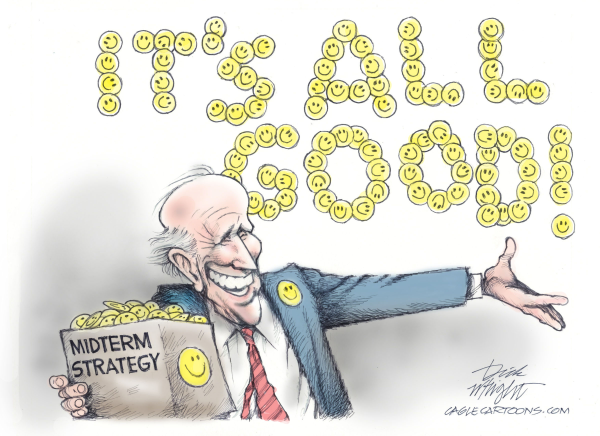
Marching in lockstep, the Democrats pushed a $700 billion spending bill through Congress, claiming it would reduce inflation. We know that to be a lie.
Independent analyses from the Congressional Budget Office, the Congressional Joint Tax Committee, and Penn/Wharton all show the badly misnamed Inflation Reduction Act would do little to nothing to stop the rate of increase in the price of goods and services.
Instead, relying on the oft-quoted strategy of never letting a good crisis go to waste, the Democrats rammed through a pared-down version of President Joe Biden’s Build Back Better plan that, to the disappointment of those who put him in office, had languished on Capitol Hill for more than a year.
Biden and the Democrats plan to spend the month of September traveling the country, trumpeting their achievement – which will be interesting to watch as no Democrat considered even remotely at risk of defeat seems to want to campaign with him. Yet the American people are not fooled. A recent NBC News poll found that 71 percent believe that if it does anything, the legislation will actually make things worse.
Inflation is still on everyone’s mind. A Rasmussen Reports survey released Monday found 85 percent of likely U.S. voters at least “somewhat concerned” about inflation, including 57 percent who are “very concerned.” That’s almost unchanged since May, the pollster reported. Nonetheless, the Democrats are already shifting gears, talking about the IRA’s caps on prescription drug prices and stimulation of America’s switch to green energy instead.
Let’s look at what’s wrong with it. One of the Democrats’ proudest boasts is that by 2030 the new law will bring down carbon emissions by 40 percent from where they were in 2005. What they don’t say is they’re already projected to drop by 30 percent over that period. Spending $370 billion to maybe gain an additional 10 percent reduction sounds like a bad deal because the reduction in global average temperature would be imperceptible.
The new law also contains provisions that will increase costs for working families, according to a release from the minority staff on the House Ways and Means Committee. Among them are a $25 billion crude oil tax and methane taxes on American energy that will disproportionately harm middle- and lower-income households by driving up the price of gasoline and traditional home heating and cooling.
When it’s cold, you can put on a sweater. When it’s beastly hot, is it fair to force working American families to choose between buying groceries and school supplies or turning on the A.C.? And that’s not even the most odious part of legislation Congress once again passed without knowing what was in it.
It makes things worse for working families in other ways. According to the Congressional Joint Tax Committee, more than 92 percent of households with incomes under $200,000 get no benefit or a tax hike. Median-income families earning $50,000-$75,000 are 33 percent more likely to get a tax hike than a tax cut. Families earning $75,000-$100,000 are four times more likely to get a tax hike, and families earning $100,000-$200,000 more than ten times more likely to see their taxes go up
If they lose, who wins? The wealthiest Americans:
– The percentage of $1 million-plus households getting a tax cut (19.4 percent) is twice as high as any other income group.
– The group with the next highest proportion of tax cuts is those earning $500,000-$1 million.
– Over the long term, 72.5 percent of households with income over $1 million get a tax cut.
The claim drugs prices will come down fares no better. The scheme the new law imposed will increase new drugs’ launch price, according to the Congressional Budget Office. If new drugs cost more, you will pay more at the pharmacy and your health insurance premiums will rise, meaning new cures could be pushed out of reach for all but the wealthiest Americans.
From top to bottom, the Inflation Reduction Act is a budget buster, driving the federal government and the nation’s families deeper into debt. Under the guise of bringing prices down, the Democrats used their momentary monopoly on power to reward the special interests who help them get elected and their electoral base.
It’s a progressive political payoff, not the salvation of the American economy.
Peter Roff is a media fellow at the Trans-Atlantic Leadership Network, a former columnist for U.S. News and World Report, and senior political writer for United Press International. Contact Roff at RoffColumns@gmail.com, and follow him on Twitter @TheRoffDraft.
Comments are not available on this story. Read more about why we allow commenting on some stories and not on others.
We believe it's important to offer commenting on certain stories as a benefit to our readers. At its best, our comments sections can be a productive platform for readers to engage with our journalism, offer thoughts on coverage and issues, and drive conversation in a respectful, solutions-based way. It's a form of open discourse that can be useful to our community, public officials, journalists and others.
We do not enable comments on everything — exceptions include most crime stories, and coverage involving personal tragedy or sensitive issues that invite personal attacks instead of thoughtful discussion.
You can read more here about our commenting policy and terms of use. More information is also found on our FAQs.
Show less